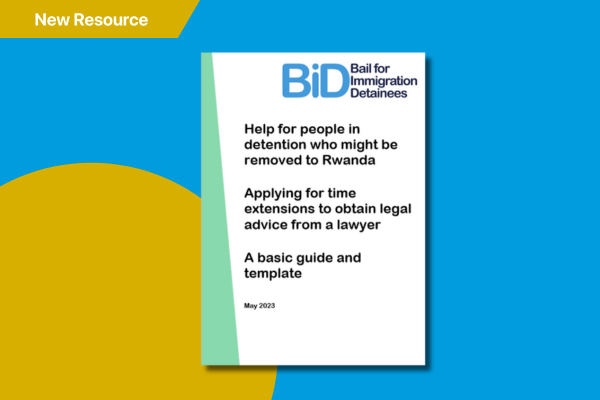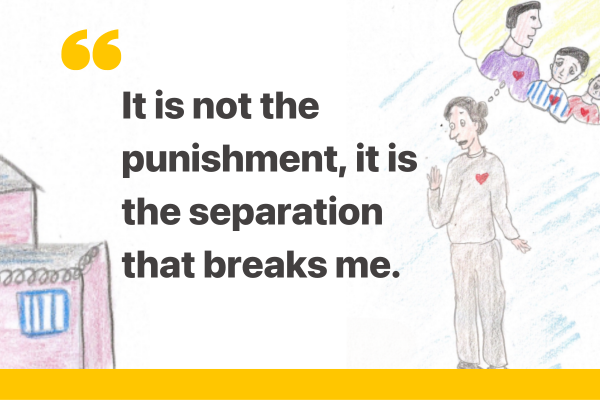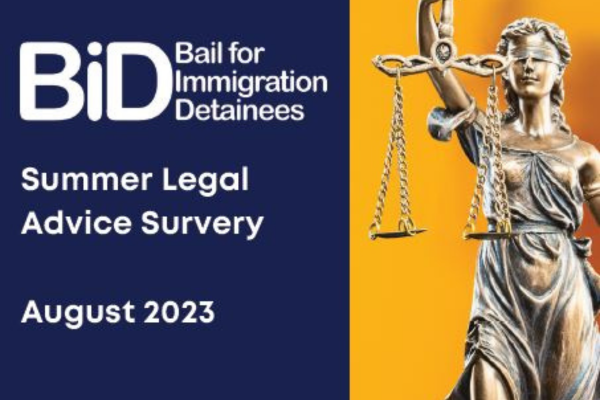Since the onset of the pandemic BID has opposed the increasing use of prisons to hold people for administrative reasons under Immigration Act powers, while those held are subjected to punitive conditions, locked in their cells for 23 hours per day, if not more. The number of those held in prisons has increased from 434 detained at the end of September 2020 to 655 at the end of December 2021 . Meanwhile, despite the High Court finding the lack of legal advice for immigration detainees in prisons to be unlawful in February 2021, improvement in access to justice has been slow and often ineffective for people in detention.
To obtain a better understanding of current conditions facing immigration detainees across the prison estate, BID undertook a review of inspection reports carried out by Her Majesty’s Inspector of Prisons (HMIP). The reports make for grim reading.
The excessive use of immigration detention
A report on HMP Huntercombe highlighted that “since the start of the pandemic, there had been a sharp increase in the number of men detained under immigration powers at the end of their sentence, some of whom should have been transferred to immigration removal centres”. An increasing number of people are being detained for administrative reasons under the Immigration Act, yet support services, including access to legal support is not readily available. This has resulted in recommendations against the use of prisons for immigratory purposes; for instance, in HMP Oakwood prisoners complained there were no immigration legal advice surgeries, and a key recommendation was that “detainees should not be held in Oakwood, unless they can be given access to free independent legal advice surgeries”.
Three individuals in HMP Wormwood Scrubs had been held under immigration powers for more than 17 months, and it was recommended that “The Home Office should inform the prison promptly of all immigration detainees assessed to be at risk in detention”, and “immigration detainees should have access to free, independent legal advice surgeries”. In HMP Hull, the population of foreign national offenders had more than doubled in a year due to COVID-19 restrictions.
In HMP Hull, a key recommendation from HMIP’s previous report had been that “prisoners subject to deportation procedures should only be held in prisons under exceptional circumstances and for as short a time as possible” , yet at the time of the subsequent inspection 11 foreign national offenders had been held for up to 11 months after the completion of their custodial sentence. In HMP High Down, staff from the Home Office had neglected to visit the prison in over a year despite 12 individuals being held after the completion of their sentence under immigration powers.
The extent to which HMIP inspections cover the experiences of immigration detainees varies considerably. In many reports, information relating to foreign national offenders does not feature, and when there is mention, it is often alongside words like ‘insufficient’. Reports on HMP Birmingham, HMP Peterborough (Male), HMP Pentonville, HMP Leicester and HMP Exeter do not provide a breakdown of how many foreign national offenders were detained, or information relating to the treatment of/provision for this group, even though at the time of each report individuals were being detained in these prisons under immigration powers.
Continued use of prolonged or indefinite solitary confinement
The reports detail quite how little time prisoners have been allowed outside of their cell; often spending 23 hours a day locked up, sometimes more. Reports based on unannounced inspections carried out across numerous prisons showed that “prisoners were effectively held in solitary confinement and in some cases in prolonged and/or indefinite solitary confinement”.
A report from HMP & YOI Chelmsford detailed how prisoners were locked in their cells for almost 23 hours a day. One prisoner described the detrimental effects this had on his wellbeing, “my mental health is at a breaking point. I get 30 minutes a week in the gym. I have been very lonely throughout the COVID-19 pandemic and was really frightened and it has left me unstable”. These views were echoed by prisoners in HMP Pentonville, one of whom said “‘I really think the unproductive time spent 23/24 hours every day, week in week out is not good for people and their physical and mental wellbeing. I'm holding it together only because this is not my first time in prison. I feel sorry for anyone who is new to prison as this is a really bad first experience. I need a job or education (neither available yet)”.
Unless prisoners had a job at HMP Risley they were in their cells for at least 23 hours a day, which “did not give them enough time for telephone calls, showers and other domestic needs, as well as outside exercise. Many prisoners spoke of the numbing and demoralising effect of being locked up for so long, especially as a 28-hour period was not uncommon from one morning to the following afternoon”. In HMP High Down, the majority of prisoners were held in their cells for 23 hours a day, there was no records of staff carrying out regular, meaningful welfare checks on prisoners, and “in some cases, no evidence of staff conversing with the prisoner for several months”.
BID and Medical Justice have carried out extensive work and research into the harms of indefinite solitary detention; which can amount to torture .
A client of BID named Richard described his experience of being detained at the end of his custodial sentence and the huge impact this had on his life. “I found it very hard to sleep, and when I did sleep I had nightmares. But then people are usually fortunate enough to wake up from the nightmare and realise it is not real. For me it was real, I was still living that nightmare.”
Short notice of immigration detention
Those detained under immigration powers in prison at the end of their custodial sentence, continue to be given unacceptably short notice that they will be held indefinitely in jail under immigration powers. In HMP Wandsworth “some foreign national prisoners had even been told on the day of their release that they were to continue to be held in the jail”, and in HMP Oakwood “two detainees were only informed of the decision to detain them the day before their release, which was unacceptable”.
This practice has an incredibly damaging impact on people’s mental and physical health as was tragically evidenced in the case of Michal Netyks, who found out on his release date that he would remain in the prison. Just hours later he took his own life. The inquest jury concluded that his death was in part contributed to by the immigration deportation process.
Richard, a client of BID was informed by the Home Office at the end of his custodial sentence that they intended to deport him to his country of origin, despite him not living there since he was a child. “Just before I finished my sentence, a few days before, I was detained from that day until they could deport me. Even though I have an appeal pending to fight the state, they told me that I was going to stay in prison until the decision was made and they would not grant me bail.”
Lack of safeguarding for adults at risk
Individuals detained in Immigration Removal Centres (IRCs) are subject to Detention Centre Rules, and those detained in prisons are subject to prison rules. Rule 35 of the Detention Centre Rules obliges medical practitioners to notify the Home Office if they are detaining vulnerable individuals (such as anyone suspected of having suicidal ideation, whose health may be affected by detention, survivors of torture). Similar provision does not exist in the Prison Rules, and medical practitioners are not obliged to notify the Home Office of vulnerabilities as in IRCs.
Introduced in 2016, The Home Office’s ‘Adults at Risk in Immigration Detention’ policy states that in all cases where consideration is being given to detain an individual for immigration purposes, an assessment must first be made to ascertain whether this person is an ‘adult at risk’. If this is the case, further assessment should be made to decide “whether the immigration considerations outweigh any risk identified. Only when they do will the individual be detained.”
However, it is unclear how well the Adults at Risk policy operates in prisons, without a Rule 35 process or equivalent. A report from HMP Wormwood Scrubs states, “as we have found in other inspections, prison staff had not heard of the policy, and there had therefore been no consideration about whether detainees assessed to be at risk should be subject to care plans”. Likewise in HMP Oakwood, “staff in the prison had not heard of the policy and had therefore not considered whether detainees assessed to be at risk should be given unit care plans”. More disturbingly, in both HMP Oakwood & HMP Wormwood Scrubs, it was shown that the Home Office had neglected to tell the prison that it had assessed certain detainees to be at risk under this policy. In HMP Oakwood “The Home Office continued to detain two detainees assessed to be at risk, despite a release recommendation from its internal detention review panel”.
In a report from the inspection of HMP Huntercombe (which only holds foreign national offenders), one third of prisoners said they felt staff had been dismissive about their concerns related to immigration cases, and one third of prisoners felt victimised by staff. A recommendation was given to the governor that “managers should carry out a thorough investigation into prisoners’ reports of staff victimisation, focusing in particular on black and minority ethnic and younger prisoners, and implement a suitable response”. In HMP High Down, young BAME and Muslim prisoners were overrepresented in segregation and the use of force. In HMP Leicester, the same unit was used to detain those with complex mental health issues and those with challenging behaviour, and concerningly the prison inspector “observed a prisoner being denied access to a shower and exercise by staff without authority, which constituted an unofficial punishment”.
The evidence arising from HMIP reports is that safeguarding measures for vulnerable adults in detention do not function effectively and staff need to be fully informed of these measures. A trauma-informed approach should be taken in all prisons which would shape the environment, culture, and regime of detention, better supporting individuals to manage and process current and existing trauma. HMIP reports that notable efforts to implement a trauma-informed approach are being recommended and implemented in women’s prisons HMP & YOI Styal and HMP & YOI Peterborough, yet there is no notable mention of any similar initiatives in the reports on male prisons. This needs to be extended across the board.
Unlawful lack of legal provision
The High Court recently found the lack of legal advice in prisons to be unlawful, a fact which the unannounced inspection reports has reinforced. In HMP Wandsworth, 45% of the prison population are foreign national offenders, yet “inexplicably, Home Office staff had absented themselves from the prison for more than a year”. In HMP & YOI Chelmsford it was found that foreign nationals had ‘poor’ access to free independent legal representation and “the library contained one out-of-date textbook on immigration law”. Around 20% of prisoners in HMP Belmarsh were foreign nationals but they had no access to free independent immigration advice and many had not been given any information on their immigration status. HMP Manchester “did not provide any information or support to help those being deported from the UK to access legal assistance”.
Detainees in HMP Hull could not access “independent legal advice and translated materials were limited”, in HMP Oakwood and HMP Wormwood Scrubs there was little or poor access to free legal representation, and “legal advice on immigration issues was not easily accessible for many prisoners” in HMP Huntercombe.
The Legal Aid Agency has recently amended the legal aid contract to provide for 30 minutes’ free legal advice for people detained in prisons under immigration powers. It is unclear how smoothly this will operate in practice and significant obstacles to accessing immigration advice remain.
Insufficient use of interpreters and translated materials
Another common theme running through these reports is that interpreters are not always used as required by staff and there is a general lack of monitoring of the use of interpreting services.
In HMP Pentonville the inspector wrote that “use of professional interpreting was poor across the prison… we met several isolated prisoners who spoke little English and were unable to communicate with staff”. Telephone interpreting services were not well used in HMP Belmarsh, with the inspector witnessing “an absurd attempt to induct a non-English-speaking prisoner without the use of an official interpreter”. In HMYOI Brinsford whilst it was acknowledged that the prison staff worked hard to meet the needs of some foreign national offenders, “this was not always the case for those of other nationalities, and we saw many isolated individuals who were not able to communicate anything other than their most basic needs to staff”.
Conclusion
Detaining people for immigration purposes is dehumanising and has hugely detrimental implications for individuals, especially when it takes place in a prison. As BID’s client Richard explains, the trauma of this experience is suffered long after the detention itself ends, “I still get nightmares about my detention, my time in prison. Even my partner tells me sometimes that I speak, I scream in my sleep”. Whilst BID opposes all forms of immigration detention, the evidence from HMIP is clear that ending detention in prisons is particularly urgent.
This article was researched and written by Jess Fogarty, a BID volunteer









